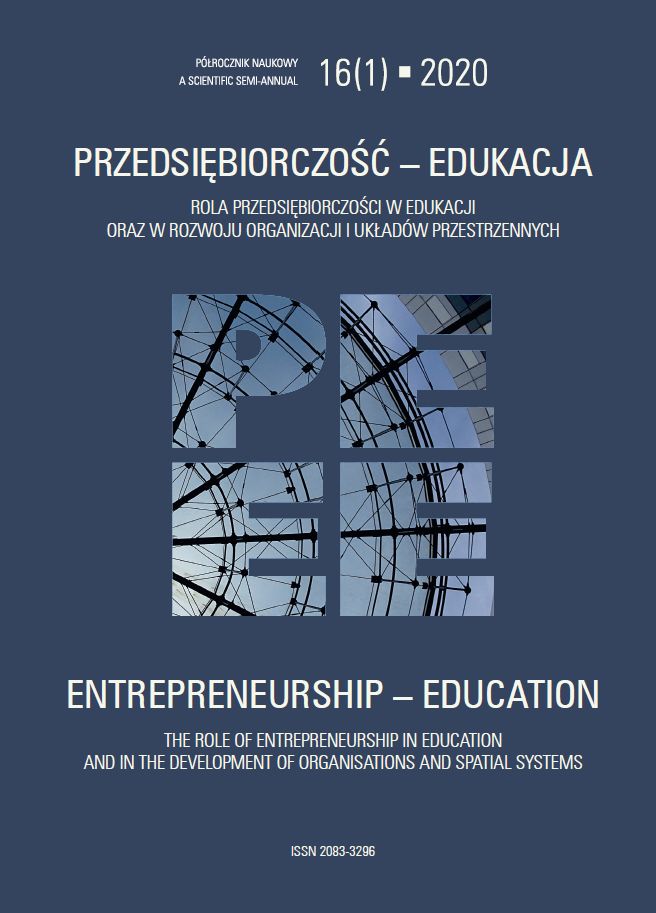Educational Challenges in Shaping the Entrepreneurship of IT Students
DOI:
https://doi.org/10.24917/20833296.161.10Keywords:
academic entrepreneurship, education of entrepreneurship, entrepreneurship of IT students, soft skills of IT students, students of computer scienceAbstract
One of the key success factors in the IT industry is innovation. It is an integral part of this industry and determines its development and, in addition, there are clear links between innovation and entrepreneurship. Entrepreneurship in the IT industry is of significant economic and social importance as it currently affects virtually every sphere of our lives. This means huge challenges for the education system in the field of entrepreneurship education among future IT specialists. The aim of the article is to analyze entrepreneurial attitudes among IT students, as well as to identify opportunities and barriers to entrepreneurship development in the IT industry in the context of educational challenges. The author formulated the following main research issue: What are the educational challenges in the field of entrepreneurship of IT students? In the research, a survey questionnaire was used for IT students at the Pedagogical University of Krakow. Research has shown that in IT studies, the importance of shaping soft competences, which are necessary for running a business, are largely omitted. They should build confidence, which is very important for people who would like to start their business however are afraid of failure, and it is the main barrier to entrepreneurship development in the IT industry. Creative activities that stimulate business ideas also play an important role in educating entrepreneurship in IT students.
References
Index of Economic Freedom. Poland (2020, March 10). Retrieved from: https://www.heritage.org/index/country/poland
Bellotti, F., Berta, R., De Gloria, A., Lavagnino, E., Dagnino, F., Ott, M., Mayer, I.S. (2012). Designing a course for stimulating entrepreneurship in higher education through serious games. Procedia Computer Science, 15, 174–186.
Bellotti, F., Berta, R., De Gloria, A., Lavagnino, E., Antonaci, A., Dagnino, F. M., Ott, M. (2013, July). A gamified short course for promoting entrepreneurship among ICT engineering students. In 2013 IEEE 13th International Conference on Advanced Learning Technologies. IEEE.
Henry, C., Hill, F., Leitch, C. (2005). Entrepreneurship education and training: can entrepreneurship be taught? Part I. Education+ Training, 47(2), 98–111.
Higgins, D., Elliott, C. (2011). Learning to make sense: what works in entrepreneurial education?. Journal of European Industrial Training, 35(4), 345–367.
Infuture Hatalska Foresight Institute. (2019). Pracownik przyszłości. Pozyskano z: http://infuture.institute/raporty/pracownik-przyszlosci/
Kuratko, D.F. (2005). The emergence of entrepreneurship education: Development, trends, and challenges. Entrepreneurship theory and practice, 29(5), 577–597.
La Guardia, D., Gentile, M., Dal Grande, V., Ottaviano, S., Allegra, M. (2014). A game based learning model for entrepreneurship education. Procedia-Social and Behavioral Sciences, 141, 195–199.
Lüthje, C., Franke, N. (2003). The ‘making’of an entrepreneur: testing a model of entrepreneurial intent among engineering students at MIT. R & D Management, 33(2), 135–147.
Milczarski, P. (2015). Teaching Entrepreneurship IT Students in Poland and Chosen EU Countries. Przedsiębiorczość i Zarządzanie, 16(6/2), 75–88.
Niedźwiedziński, M., Klepacz, H., Szymańska, K. (2016). Wspieranie przedsiębiorczości akademickiej w branży informatycznej a przemiany na rynku pracy. Przedsiębiorczość i Zarządzanie, 17(4/1), 355–366.
Oosterbeek, H., Van Praag, M., Ijsselstein, A. (2010). The impact of entrepreneurship education on entrepreneurship skills and motivation. European Economic Review, 54(3), 442–454.
Peterman, N.E., Kennedy, J. (2003). Enterprise education: Influencing students’ perceptions of entrepreneurship. Entrepreneurship Theory and Practice, 28(2), 129–144.
Rasmussen, E.A., Sørheim, R. (2006). Action-based entrepreneurship education. Technovation, 26(2), 185–194.
Soares, F.O., Sepúlveda, M.J., Monteiro, S., Lima, R.M., Dinis-Carvalho, J. (2013). An integrated project of entrepreneurship and innovation in engineering education. Mechatronics, 23(8), 987–996.
Souitaris, V., Zerbinati, S. and Al-Laham, A. (2007). Do entrepreneurship programmes raise entrepreneurial intention of science and engineering students? The effect of learning, inspiration and resources. Journal of Business Venturing, 22(4), pp. 566–591.
Vesper, K. H., Gartner, W. B. (1997). Measuring progress in entrepreneurship education. Journal of Business Venturing, 12(5), 403–421.
Wilson, F., Kickul, J., Marlino, D. (2007). Gender, Entrepreneurial Self-Efficacy, and Entrepreneurial Career Intentions: Implications for Entrepreneurship Education. Entrepreneurship Theory and Practice, 31(3), 387–406.
Downloads
Published
How to Cite
Issue
Section
License
Articles are published under the terms of the Creative Commons License (CC BY-ND 4.0; Attribution– NoDerivs).

